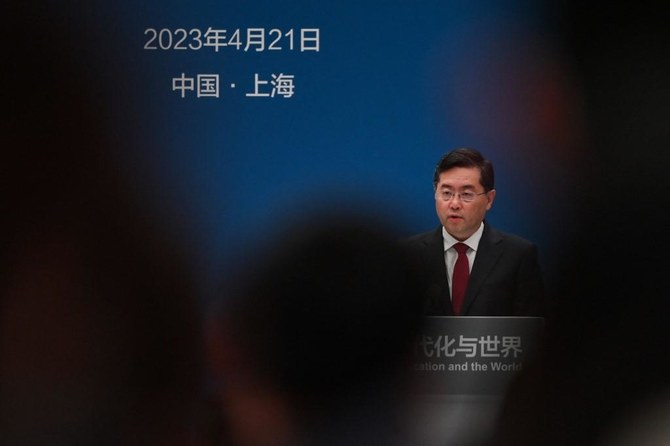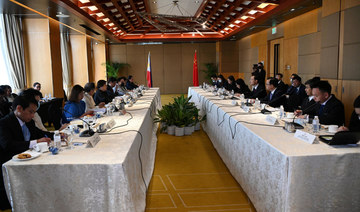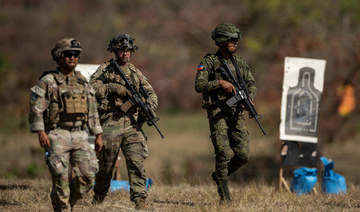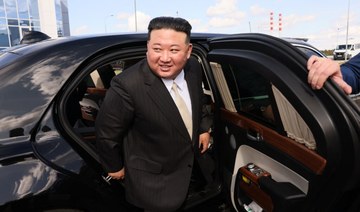MANILA: Chinese Foreign Minister Qin Gang was due to arrive in Manila Friday to try to boost ties with the Philippines, which is staging its largest-ever military exercises with the United States.
Philippine officials said Qin is set to meet President Ferdinand Marcos on Saturday after an initial meeting with his Philippine counterpart Enrique Manalo.
Qin’s visit coincides with the Philippines and the United States holding their largest joint military exercises, with nearly 18,000 troops taking part in live-fire and combat drills until April 28.
Marcos has sought to strengthen ties with Washington after his predecessor, Rodrigo Duterte, trashed the alliance and shifted toward Beijing for economic deals and infrastructure projects.
This was despite conflicting territorial claims between China and the Philippines in the strategic South China Sea.
“Regional security issues of mutual concern” will be part of the discussions, the Department of Foreign Affairs (DFA) said in a statement. Strengthening cooperation in agriculture, trade, energy and infrastructure is also on the agenda.
Chinese foreign ministry spokesman Wang Wenbin said on Friday Qin’s visit is aimed at “enhancing mutual trust” and “properly handling differences” with the Philippines.
“China looks forward to strengthening communication with the Philippines through this visit,” Wang told a regular briefing.
Overlapping claims in the South China Sea have been a sticking point in the relations between the two countries.
Beijing claims almost the entire waterway, deploying hundreds of vessels there to patrol the waters and occupy reefs.
It has also ignored a 2016 international tribunal ruling that its claims have no legal basis.
Qin will be marking his first visit to the Philippines as foreign minister.
His predecessor, Wang Yi, was the first foreign minister to visit Marcos last year, describing his election in June as “turning a new page” that would create a “new golden age of bilateral relations” between the two countries.
Since then, however, Marcos has gravitated closer to the United States.
The Philippine leader will meet US President Joe Biden next month to discuss efforts to strengthen the longstanding alliance between the treaty allies.
Manila and Washington agreed in recent months to restart joint maritime patrols on the South China Sea and agreed to expand US forces’ presence in the country.
Marcos has also allowed the United States to rotate its troops around four additional sites under a 2014 deal that originally identified five locations.
The new bases include a naval base and airport in northern provinces near Taiwan and an air base off an island near the South China Sea.
While the Philippine military is one of the weakest in Asia, the country’s proximity to Taiwan and its surrounding waters would make it a key partner for the United States in the event of a conflict with China.
The DFA said Qin’s visit will also build on Marcos’ visit to Beijing in January, when he and Chinese president Xi Jinping agreed on a “friendly” handling of disputes.
Weeks after Marcos’s visit, Manila accused a Chinese vessel of using a military-grade laser light against a Philippine patrol boat.
The DFA had said it filed more than 70 protests against China’s “persistent and illegal presence in Philippine water” since Marcos assumed the presidency last year.
Chinese FM to visit Manila during Philippines-US war games
https://arab.news/vs8x3
Chinese FM to visit Manila during Philippines-US war games

- Overlapping claims in the South China Sea have been a sticking point in the relations between the two countries
In India, Muslims and Hindus come together to celebrate Eid Al-Adha

- Hindu-majority India has the world’s largest Muslim-minority population, comprising 200 million people
- Muslim and Hindus traditionally get together during religious festivals to celebrate each other’s holidays
NEW DELHI: Indian Muslims and Hindus celebrated Eid Al-Adha on Monday in the spirit of togetherness, as they shared meals to mark the Feast of Sacrifice.
With over 200 million people professing Islam, Hindu-majority India has the world’s largest Muslim-minority population.
Indian Muslims joined in communal prayers across the country on Monday to start their celebrations of Eid Al-Adha, the second of the two main holidays observed in Islam.
“Eid is the most sacred festival for us. The day starts with morning prayer in the mosque nearby, then we prepare the sacrifice of the goat,” Mohammed Altaf, who lives in Delhi, told Arab News.
Eid Al-Adha commemorates the Prophet Ibrahim’s test of faith when he was commanded by God to sacrifice his son. To reflect his readiness to do so, Muslims around the world slaughter an animal, usually a goat, sheep or cow, and distribute the meat among relatives and the poor.
The holiday is also a time of unity and togetherness for Muslims, with many looking forward to spending the day with friends of different faiths.
“I cherish (welcoming) my Hindu neighbors to my home when they come for a special meal,” Altaf said. “I live in a mixed-housing society, and it has been custom for many years to invite my Hindu friends from the community and outside to partake in the food that we prepare on this special occasion.”
Altaf’s household usually makes several preparations of mutton and at least one sweet dish to serve the guests.
“Not only that, we distribute the raw meat of the sacrificed animals to our relatives and Hindu friends, too. This meat is very sacred, and everyone understands that,” he added.
Indian Muslims have faced increasing discrimination and challenges in the past decade, accompanied by tensions and riots ignited by the majoritarian policies of the Hindu right-wing Bharatiya Janata Party, which rose to power in 2014.
Despite incidents of communal violence, Altaf believes that there are people “who know the value of celebrating the festival together,” in order to keep “the secular spirit of India alive.”
The spirit of togetherness binds India’s diverse communities, said Naser Khan, a resident of Malerkotla city in Punjab.
“Eid Al-Adha means happiness … This is a very pure festival, and we celebrate it with lots of joy,” Khan said.
“In India, Eid is not a one-religion festival. Here, people from all faiths participate in each other’s festivals. On Eid, we invite our Hindu and Sikh friends to dine with us and partake whatever we prepare. It becomes an occasion to assert our sense of community and strengthen our communal bonding.”
Prof. Espita Halder, a Hindu woman from Kolkata, was also joining the festivities with her Muslim friends this Eid.
“We need to create a narrative of harmony. People come close to each other during this festival,” she said.
Meha Dhondiyal, another Hindu woman based in Lucknow, said Eid has always been “a part of our lives.” She learned the tradition of joining Eid feasts from her father and has since carried it forward with her own Muslim friends.
“A nation that celebrates together stays together. Festivals are not only religious but of shared culture. And it makes us happy to celebrate Diwali and Holi festivals with Muslim friends,” Dhondiyal told Arab News.
“It’s also important that in this time of provoked hate due to politics, we keep alive the real alternate narrative of harmony and togetherness. It’s the best way we can think of telling our Muslim friends that they’re not alone. We are together.”
In India, Muslims and Hindus come together to celebrate Eid Al-Adha

- Hindu-majority India has the world’s largest Muslim-minority population, comprising 200 million people
- Muslim and Hindus traditionally get together during religious festivals to celebrate each other’s holidays
NEW DELHI: Indian Muslims and Hindus celebrated Eid Al-Adha on Monday in the spirit of togetherness, as they shared meals to mark the Feast of Sacrifice.
With over 200 million people professing Islam, Hindu-majority India has the world’s largest Muslim-minority population.
Indian Muslims joined in communal prayers across the country on Monday to start their celebrations of Eid Al-Adha, the second of the two main holidays observed in Islam.
“Eid is the most sacred festival for us. The day starts with morning prayer in the mosque nearby, then we prepare the sacrifice of the goat,” Mohammed Altaf, who lives in Delhi, told Arab News.
Eid Al-Adha commemorates the Prophet Ibrahim’s test of faith when he was commanded by God to sacrifice his son. To reflect his readiness to do so, Muslims around the world slaughter an animal, usually a goat, sheep or cow, and distribute the meat among relatives and the poor.
The holiday is also a time of unity and togetherness for Muslims, with many looking forward to spending the day with friends of different faiths.
“I cherish (welcoming) my Hindu neighbors to my home when they come for a special meal,” Altaf said. “I live in a mixed-housing society, and it has been custom for many years to invite my Hindu friends from the community and outside to partake in the food that we prepare on this special occasion.”
Altaf’s household usually makes several preparations of mutton and at least one sweet dish to serve the guests.
“Not only that, we distribute the raw meat of the sacrificed animals to our relatives and Hindu friends, too. This meat is very sacred, and everyone understands that,” he added.
Indian Muslims have faced increasing discrimination and challenges in the past decade, accompanied by tensions and riots ignited by the majoritarian policies of the Hindu right-wing Bharatiya Janata Party, which rose to power in 2014.
Despite incidents of communal violence, Altaf believes that there are people “who know the value of celebrating the festival together,” in order to keep “the secular spirit of India alive.”
The spirit of togetherness binds India’s diverse communities, said Naser Khan, a resident of Malerkotla city in Punjab.
“Eid Al-Adha means happiness … This is a very pure festival, and we celebrate it with lots of joy,” Khan said.
“In India, Eid is not a one-religion festival. Here, people from all faiths participate in each other’s festivals. On Eid, we invite our Hindu and Sikh friends to dine with us and partake whatever we prepare. It becomes an occasion to assert our sense of community and strengthen our communal bonding.”
Prof. Espita Halder, a Hindu woman from Kolkata, was also joining the festivities with her Muslim friends this Eid.
“We need to create a narrative of harmony. People come close to each other during this festival,” she said.
Meha Dhondiyal, another Hindu woman based in Lucknow, said Eid has always been “a part of our lives.” She learned the tradition of joining Eid feasts from her father and has since carried it forward with her own Muslim friends.
“A nation that celebrates together stays together. Festivals are not only religious but of shared culture. And it makes us happy to celebrate Diwali and Holi festivals with Muslim friends,” Dhondiyal told Arab News.
“It’s also important that in this time of provoked hate due to politics, we keep alive the real alternate narrative of harmony and togetherness. It’s the best way we can think of telling our Muslim friends that they’re not alone. We are together.”
Marcos wishes Muslims jubilant celebration as Philippines observes Eid Al-Adha

- Muslims constitute around 10 percent of the nearly 120 million population
- June 17 was declared a national holiday to observe Eid Al-Adha in the Philippines
MANILA: President Ferdinand Marcos Jr. wished Muslims a fruitful celebration on Monday as the Catholic-majority Southeast Asian nation observed Eid Al-Adha.
Muslims make up around 10 percent of the nearly 120 million, predominantly Catholic population, according to 2024 data from the National Commission for Muslim Filipinos.
The minority community is collectively referred to as the Moro people, in reference to the 13 ethnolinguistic groups that form the largest non-Christian group in the country. Most live on the island of Mindanao and the Sulu archipelago in the Philippines’ south, as well in the capital Manila and the central-western province of Palawan.
Earlier this month, Marcos declared June 17 a national holiday to observe Eid Al-Adha, the second of the two main holidays observed in Islam.
“As we observe Eid Al-Adha, let us embrace the lessons of sacrifice and unconditional faith. May this celebration inspire us to uplift lives and create a Bagong Pilipinas rooted in righteousness and peace,” Marcos said in a statement issued on Monday, referring to his New Philippines slogan.
“I wish you a jubilant celebration of your faith and vows of sacrifice. Eid Mubarak!”
Eid Al-Adha commemorates the Prophet Ibrahim’s test of faith when he was commanded by God to sacrifice his son, and also marks the culmination of Hajj, the annual pilgrimage that is one of the five pillars of Islam.
For Muslim Filipinos, like other Muslims across the world, Eid is an “opportunity to learn to rekindle the spirit of faith, self-sacrifice, kindness and generosity,” said former NCMF commissioner Yusoph Mando.
Mando said he spent the holiday with family and friends, as Eid for many was about learning to cherish the time spent with loved ones.
Though much of Asia, including Indonesia, Malaysia, India and Bangladesh, observed Eid Al-Adha on Monday, Filipinos joined Muslims in other parts of the globe, including in Saudi Arabia, Libya, Egypt and Yemen, in starting the celebrations on Sunday.
Ebra Moxsir, a retired police colonel and national president of the Imam Council of the Philippines, said that Eid Al-Adha was “a time for unity and solidarity among Muslims.”
But for others, Eid celebrations are quieter this year as they reflect on the sufferings of Palestinians in Gaza.
“We did not spend time with a lot of relatives like before because we could not feel complete happiness with the genocide going on in Gaza,” Enisha Alin Guro, a resident of Marawi City, told Arab News.
Guro said her celebrations are muted “out of sympathy for the people of Gaza who will not be celebrating Eid as a complete family or with food on the table or a home to go home to.”
Vladimir Putin to visit Kim Jong Un in North Korea this week

- North Korean leader Kim Jong Un extended an invite to Putin during a visit to Russia’s Far East last September
MOSCOW: Russian President Vladimir Putin will visit North Korea on Tuesday and Wednesday, the Kremlin said, an extremely rare trip that underscores Moscow’s burgeoning partnership with the reclusive nuclear-armed state.
North Korean leader Kim Jong Un extended an invite to Putin during a visit to Russia’s Far East last September. Putin has not visited Pyongyang since July 2000.
“At the invitation of the Chairman of State Affairs of the DPRK, Kim Jong Un, Vladimir Putin will pay a friendly state visit to the Democratic People’s Republic of Korea on June 18-19,” the Kremlin said.
After North Korea, Putin will visit Vietnam on June 19-20, the Kremlin said.
Russia has gone out of its way to publicize the renaissance of its relationship with North Korea since the start of the war in Ukraine, which has triggered the biggest crisis for more than 60 years in Moscow’s relationship with the West.
For Putin, who says Russia is locked in an existential battle with the West over Ukraine, courting Kim allows him to needle Washington and its Asian allies while securing a deep supply of artillery for the Ukraine war.
The United States and its allies say North Korea has supplied weapons to Russia to help it fight in Ukraine, though North Korea has repeatedly denied the claims as a fiction invented by Western propagandists.
Philippine captain vows to return to sea after Houthi attack

- Tutor’s captain Christian Domarique: ‘We first need to rest because of the trauma’
- Houthis claimed responsibility for a missile strike on the Liberia flagged, Greek-owned coal carrier Tutor
MANILA: The Philippine crew of a vessel attacked by Yemen’s Houthi militants was repatriated to the Philippines from Bahrain on Monday, with the ship’s captain vowing to return to the seas after the crew had recovered from the experience.
Iran-aligned Houthis claimed responsibility for a missile strike on the Liberia flagged, Greek-owned, coal carrier Tutor near the Yemeni port of Hodeidah on June 12. The ship was carrying 22 crew from the Philippines and one is still missing in the flooded engine room.
“We first need to rest because of the trauma,” the Tutor’s Captain Christian Domarique told a press conference at Manila airport. “We will recover for a few months before returning.”
Houthi attacks have struck three vessels crewed by Filipino seafarers since last year, killing two sailors, with 17 still being held captive by militants, government data showed.
A tearful Domarique thanked God, his company, and government agencies for assisting him and his fellow seafarers to get back to the Philippines.
The government has pledged financial and psychological assistance for the 21 crew members.
“The captain has good working years ahead of him so with the crew that is relatively young, they will still have more seafaring years ahead of them,” Hans Leo Cacdac, the Philippines’ migrant workers minister, told a press conference.
The vessel’s owner pledged to continue the search for the missing sailor alongside a salvaging operation to tow the stranded ship, Cacdac said, which on Friday was adrift in the Red Sea.
The Houthis, who have said their attacks are in support of Palestinians in Gaza, have disrupted global shipping, causing delays and costs to cascade through supply chains.
At least 65 countries and major energy and shipping companies — including Shell, BP, Maersk and Cosco — have been affected, according to a report by the US Defense Intelligence Agency.




















